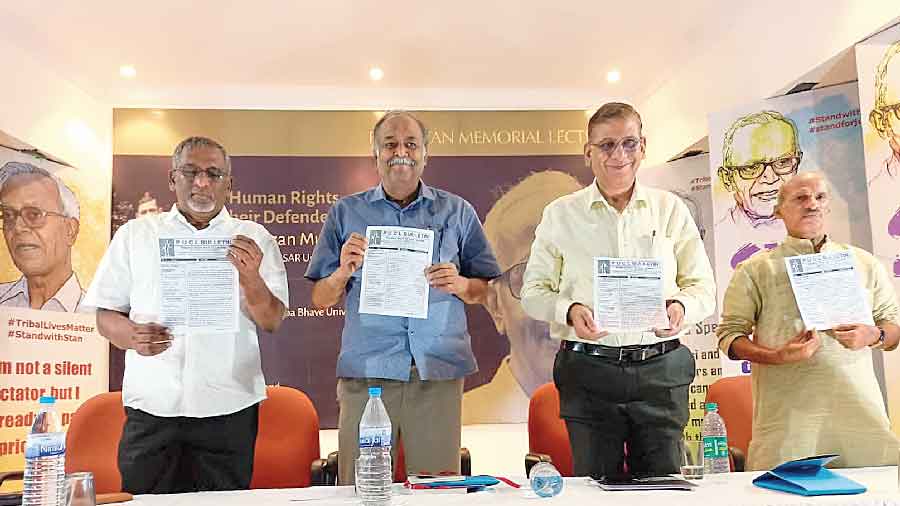India needs more human rights defenders, constitutional law expert Faizan Mustafa said in Ranchi on Friday as he paid tribute to the late Father Stan Swamy and criticised the State’s tendency to crack down on rights activists.
Mustafa, vice-chancellor of the National Academy of Legal Studies and Research, Hyderabad, was addressing the inaugural Stan Memorial lecture on “Why human rights and their defenders matter”, organised by the People’s Union for Civil Liberties, Jharkhand.
“Father Stan Swamy’s entire life was spent fighting for others’ rights. He was not against any particular government or political party,” Mustafa said about the tribal rights defender who died in custody last year.
“During the early ’90s, when he started his fight, there was another political party in power at the Centre. Human rights defenders are ‘wasoolon ka ghulam’ (prisoners of conscience) and they question the nexus between corporate groups, religion and the State and in the process become enemies of the State as they try to curb the power of the State.”
Mustafa criticised the arrests of human rights activists without mentioning names.
“It is atrocious that human rights defenders are arrested and forced to undergo a media trial without being given a fair trial. No one can be imprisoned without a fair trial, and dissent is the main condition of democracy,” he said.
Father Stan, 84, who suffered from Parkinson’s Disease, was arrested in the Elgaar Parishad-Maoist links case in October 2020 and died in custody in Mumbai on July 5, 2021, while awaiting bail.
A week ago, Gujarat police arrested social activist Teesta Setalvad, a critic of the then Narendra Modi-led Gujarat government’s handling of the 2002 riots and its aftermath.
“The source of human rights is not the Constitution and the law — it is enough to be human. Human rights defenders fight for the rights of others,” Mustafa said.
He cited how Father Stan had come to Jharkhand “from another state (Tamil Nadu) and was not familiar with the language” but the “pain and suffering (of the tribal communities) forced him to stay” back.
He said it would be a fitting tribute to Father Stan to take a pledge not to harm anybody’s rights or let anyone violate another’s rights, and to become a voice for the voiceless, poor and marginalised.
Mustafa deplored the increasing religious fanaticism in the country and condemned the beheading of a tailor in Udaipur by a member of another community. “Such acts are not permitted in law (or) any religion. Who is teaching such religious fanaticism in our country? Religious fanaticism has been used to rise to power in the country,” he said.
“When we speak on religious issues we are (often) trying to divert (people) from the real issues faced by the country, like unemployment, poverty and exploitation.”
Mustafa, given the Shah Waliullah International Award by the Institute of Objective Studies, New Delhi, in 2009 for his paper on “Constitutionalism in Islamic Perspective”, welcomed dissent in religion.
He said blasphemy was not a crime in modern democracies but hate speeches inciting violence certainly were.
“Religion is a private matter and an individual should have the freedom to change over to any religion, or not follow any religion,” he said.











